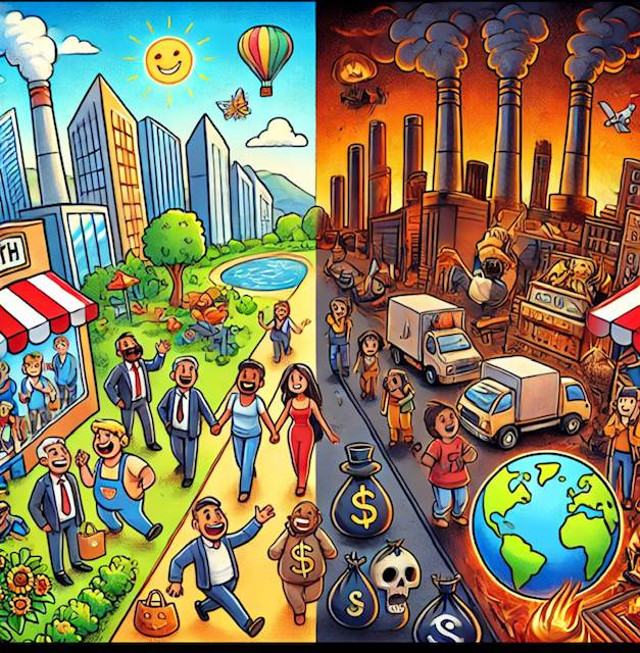Tentang KamiPedoman Media SiberKetentuan & Kebijakan PrivasiPanduan KomunitasPeringkat PenulisCara Menulis di kumparanInformasi Kerja SamaBantuanIklanKarir
2024 © PT Dynamo Media Network
Version 1.93.2
Konten dari Pengguna
Capitalism’s Hidden Costs: What We Don’t Talk About
9 Desember 2024 13:00 WIB
·
waktu baca 5 menitTulisan dari Usman Mohammed Abba tidak mewakili pandangan dari redaksi kumparan

ADVERTISEMENT
Few forces in human history have reshaped society as profoundly as capitalism, it has driven unparalleled innovation, wealth creation and individual freedom never seen in past societies preceding all other economic systems. Its ability to allocate resources efficiently, entrepreneurship and also the reinforcement of private property law has indeed made it the most dominant economic paradigm in the world currently. However beneath the greatly celebrated successes lies hidden costs that appear with the evolution of capitalism itself. These effects extend beyond individuals and society but also the environment, with growth as the sole focus of capitalism achieving long term sustainability with the practices of capitalism appears increasingly unfeasible leading to consequences unforeseen by the world.
ADVERTISEMENT
We begin by examining the societal effects of capitalism. With the increase in income and standard of living greatly attributed to capitalism and unseen by previous societies, many individuals still grapple with a declining quality of life. Depression rates continue to soar across various countries, signaling deeper issues within society. Capitalism’s sole focus on growth inadvertently drives inflation, which chips away the purchasing power of middle- and low-income earners while further enriching the wealthiest. This has led to severe wealth inequality and social stratification. When capital is concentrated in the hands of a few, accumulation ensues which makes upward mobility increasingly unattainable, deepening societal disparities. This inequality is often perpetuated through systemic factors like unequal access to education, healthcare, and capital. As a result, those born into wealth have far more opportunities to succeed, while those in lower-income brackets face structural barriers. Although capitalism rewards innovation and hard work, it often consolidates wealth among a small elite. In many nations, the richest 1% control more wealth than the bottom 50%, a stark divide that fuels social unrest and political instability. The world’s top 1% own more wealth than 95% of humanity, showing the severity of the situation and posing a huge threat to future harmonious living.
ADVERTISEMENT
Next we take a look at capitalism’s effect on the environment which carries the most devastating effects, the environment in general has scarcely benefitted from capitalism. Once again putting into focus capitalism’s sole and relentless focus on growth creates a disadvantageous situation for the environment. Pursuit of profit has created a situation where ethics and conservation are not taking into consideration in society with most industries prioritizing short term gains over long term sustainability. These factors all together leads to overexploitation of natural resources, deforestation, over consumption, pollution and finally climate change which is greatly changing the world. With growth constantly as the objective a lot of industries have taken up practices such as aggressive marketing, planned obsoleteness, and speculation all which negatively impacts the environment. Aggressive marketing and planned obsoleteness where products are designed to have limited lifespans to encourage repeat purchases which people don’t actually need, increasing waste and environmental harm. For pollution most companies nowadays cut cost by disposing industrial wastes unethically and use cheap and toxic materials for production. Over exploitation and consumption deplete natural resources vastly with no focus on replenishment, such as the fishery and logging industries. Close to 90% of the world's marine fish stocks are fully exploited, overexploited or depleted. While logging activities that lead to unsustainable or irrecoverable deforestation and permanent habitat destruction for forest wildlife which greatly harms biodiversity and erodes animal habitats. Between 2010 and 2020, the net loss in forests globally was 4.7 million hectares per year.1 However, deforestation rates were much higher. The UN FAO estimates that 10 million hectares of forest are cut down each year. The last major aspect contributing to the degradation of the environment that cannot be skipped is energy, arguably the singlehandedly greatest contributor to pollution. Fossil fuels and capitalism are fully intertwined, from the advent of the industrial revolution fossil fuels played an undeniable role in enhancing capitalism. The modern society runs on fossil fuels making it a weakness that cannot be easily remedied. Once again due to companies enacting cost cutting majors they rely fully on fossil fuels and avoid more expensive renewable energies that are better for the environment. While capitalism has driven economic growth and a rapid increase in the standard of living, it has also led to higher CO2 concentrations and greenhouse gases in the atmosphere than in any period in history.
ADVERTISEMENT
In conclusion we can’t overlook the great impact capitalism has had on the human society it has greatly shaped the world we live in and has brought a lot good, but in other to move on as a thriving society with a keen focus on sustainability the hidden cost of capitalism can’t be ignored any further. Capitalism's relentless pursuit of growth at the expense of sustainability has placed immense strain on the environment and has greatly fragmented the society, all these highlight the urgent need for a reevaluation of the current economic system. We have to rethink the very foundations of capitalism, ensuring that both people and the planet are prioritized alongside profit which won’t be easily achieved. This step has to be taken by all stake holders in the society from the government, businesses and consumers, we all need to embrace a sustainable and responsible way of living. Consuming less and creating a communal economy where you consume what you need and share with others what you would consider as over consumption. Adding all these different practices together would greatly help improve the world.
ADVERTISEMENT
References:
Oxfam International: https://www.oxfam.org/en/press-releases/worlds-top-1-own-more-wealth-95-humanity-shadow-global-oligarchy-hangs-over-un
UNCTAD - A man-made tragedy: The overexploitation of fish stocks: https://unctad.org/news/man-made-tragedy-overexploitation-fish-stocks
Author: Hannah Ritchie - Deforstation & forest loss.
https://ourworldindata.org/deforestation
Author: Eric Koons - Capitalism & climate change: A dual force shaping out future. https://energytracker.asia/capitalism-and-climate-change/

